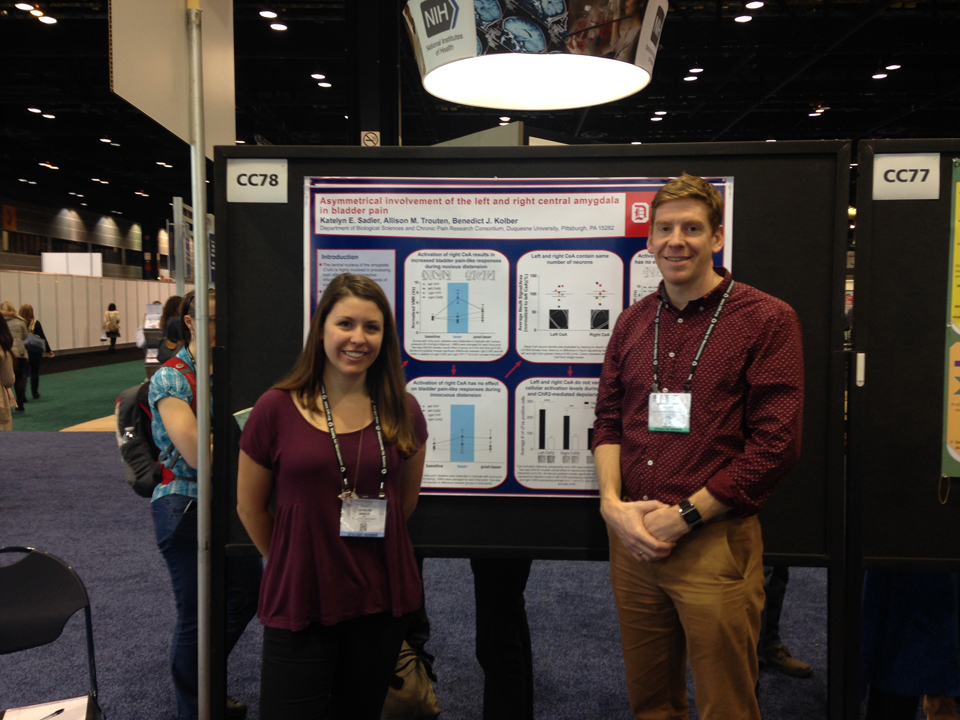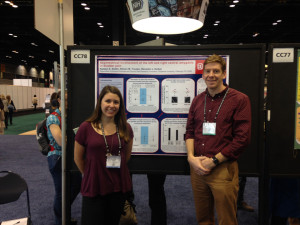

Biology Ph.D student Katelyn Sadler and Duquesne professor Ben Kolber pose for a photo at the Neuroscience 2015 Conference, where they presented Sadler’s research on the causes of bladder pain. Sadler received a grant for her work.
By Brandon Addeo | Asst. News Editor
A Bayer School of Natural and Environmental Sciences graduate student just returned from an international science conference in Chicago where she presented her research on bladder pain.
Fifth year biology Ph.D candidate Katelyn Sadler, along with assistant biology professor and research coordinator for Bayer’s Chronic Pain Research Consortium Ben Kolber, traveled to the “Neuroscience 2015” conference Oct. 17 hosted by the Society for Neurosciences and presented a poster on how the brain is related to the processing of bladder pain.
This came shortly after Sadler was awarded the Ruth L. Kirschstein National Research Service Award Predoctoral Fellowship by the National Institutes of Health. The $38,419 grant covers teaching stipends, travel expenses for conferences, small equipment purchases and Sadler’s Duquesne tuition.
Sadler’s research concerns the central amygdala, an emotion-processing part of the brain, and its relation to bladder pain. Sadler tests this relationship by analyzing discomfort levels in the bladders of lab mice, in line with animal testing regulations and ethics, Kolber said.
The main goal of the research is to find better ways to clinically treat bladder pain, Sadler said.
Kolber, who is Sadler’s assigned mentor in her research, said the grant is a “big accomplishment” for Sadler.
“Most of these awards go to big research institutions rather than medium-sized institutions like Duquesne,” he said. “It’s an important accomplishment for Kate to receive one of these [grants] but I think it’s also good for Duquesne because I think it proves to the world [that] our graduate students are just as good as they are anywhere else.”
Sadler, who did undergraduate study in microbiology at Duquesne, said she did not originally know what line of graduate research she wanted to pursue, but made her decision during a rotation as a graduate student in Kolber’s lab, where he studies bodily stress and pain.
“Dr. Kolber’s lab was very, very different,” she said. “I thought it presented a novel challenge that I really enjoyed and I really like the applicability of the research to human health.”
Kolber said studying effects of the brain may help to explain questions in chronic bladder pain.
“A lot of these bladder patients don’t just have constant bladder pain, but they also have other problems associated with that bladder pain: changes in their ability to deal with stress, some people even have depression and anxiety disorders,” Kolber said. “That’s obviously not coming from the bladder, it’s something driven by the brain.”
Sadler said the award will allow her to focus on her research, as the fellowship award grants exemption from her graduate teaching assistant requirement—she instead will become a “research assistant.”
“[The grant] eliminates some of the teaching responsibilities that I would have had, so I can dedicate all my time on a daily basis to doing research,” she said.
Sadler began working on the project in 2011, and has attended the neuroscience conference for the past four years. The event hosts around 30,000 people annually, and Sadler said conference-goers took notice of her work.
“[We] had lots of people come by and ask me about my research,” she said.
Sadler added that the conference was a “great opportunity” to network and meet potential employers.
Sadler said reaching the project’s goal may take some time, but is hopeful for the future.
“I think we’re pretty far off still,” she said. “I think my project is just the beginning of exploring these types of questions.”




